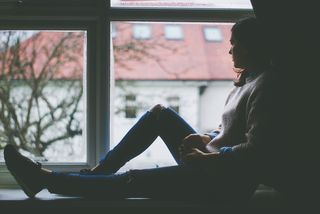Coronavirus Disease 2019
COVID-19: It’s OK to Feel Overwhelmed and Be Unproductive
Do you feel pressure to "make the most" out of lockdown? Let it go.
Posted March 25, 2020 Reviewed by Gary Drevitch

I initially felt inspired by the grit and enthusiasm displayed on social media last week. We, as a human community, were making the most of our situation. Though dire circumstances confined us to our homes, we could make lemonade out of these bitter lemons. And fresh baked bread, too.
It’s a funny thing, this paradox within the pandemic. A terrible thing is happening in the world around us, or in our own personal worlds. Many people are sick or have died. Many people, including ourselves or those we know, have lost their jobs. So many are living in fear. Yet as life as we knew it began to shut down, we marveled at having time for the simple things. I’ve heard so many people talk about the simple joy found in taking a (properly distanced) walk outside every day.
We celebrate innovation around connecting (how did it never occur to my husband, or myself, to have video “distance dinners” with far-flung loved ones?). We have more time for meaningful conversations, with people we haven’t had time for in years. Many have shared that this experience is teaching us, like a slap to the face, what matters most. We profoundly appreciate things we took so for granted. These insights are all good, of course.
When the novelty of all this started to wear off, though, and the inspirational examples piled up, it felt as if possibilities turned into pressure. Now that so many of us are confined to our homes, we have to do important, fun or creative things.
We can use the extra time to take courses! Create works of art! Write books! Redecorate! We shouldn’t waste a moment of the gift of confinement. We must make the most of it all! Ideally, it should all be delightfully “Instagrammable”, too.
I believe that, in addition to celebrating the gritty human drive to rise above our circumstances, we need to give each other permission to grieve. To be afraid. To sit with our emotions. To slow down. To slow way down, if we need to (and are able to).
There’s nothing wrong with being productive or creative. It can be a helpful, constructive way to cope. But we must also allow ourselves space to not be “amazing." Our world has not faced anything like this in over a century. It’s big. It’s ok, and even appropriate, to not be ok.
Some people may feel like failures because they are not sufficiently "seizing the moment" within this pandemic. Because they are struggling to cope. I have felt this way at times.
I feel better today, buoyed by hopeful news (like today's report that social distancing may be slowing the virus in NYC). But my general mood has been somber. I have grieved over stories from physicians in Italy. There's the devastating economic impact. It's all so much.
If you're tapping into fresh reservoirs of strength and inspiration, celebrate that. You can use your energy to help others, too. But if you’re really struggling as you watch it all unfold, feeling fear as this thing marches closer, or mourning your own real losses, that's a normal reaction.
I prefer to be a "hero," one who rises above circumstances to encourage and help others. We need our heroes, that’s for sure. But sometimes we must simply allow ourselves to be humbled by a situation. To grieve what's happening, to not know what to do next. To be messy. To handle things imperfectly. To not have anything "Instagrammable" to share with the world right now.
Allow yourself to feel the reality of what you’re going through. Reach out, if it would help to talk to someone (it probably would). Journal your feelings. You don’t have to present a brave face to the world, if you’re having a tough time. If negative emotions threaten to overwhelm, find a counseling professional who works with people virtually or by phone.
I’ll say it again: If you’re feeling like all of this is too much—it’s because it is.
© 2020 Dr. Susan Biali Haas
Facebook image: Dean Drobot/Shutterstock


